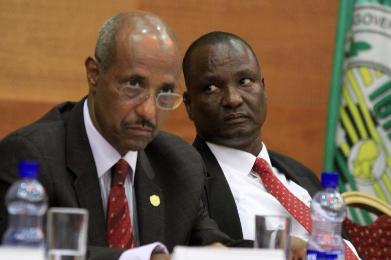South Sudan peace talks stall over participation of seven officials
April 1, 2014 (JUBA) – Peace talks end the 14-week-old conflict in South Sudan, are stalled over the government’s insistence on the non-participation of seven officials from the governing Sudan People’s Liberation Movement (SPLM) who were arrested in connection to allegation that they played a role in an alleged attempted failed coup.

“They said they want to go for consultation with the heads of state from IGAD member countries and they will give one month break, which goes up to the 30th of April,” said Nyuot
John Luk Jok, spokesperson of the seven SPLM officials said in a statement extended to Sudan Tribune on Tuesday that the talks were stalled because of the government’s rejection of their participation as signatories to the declaration of principles.
“The government delegation vigorously objected our inclusion as signatory to the document and led to the non-signing of the declaration of principles. This attitude of the government delegation was indeed obstructive to the process and a blatant violation of the IGAD Communiqués” the statement said.
The heads of State and governments of the IGAD member countries emphasised in a joint communiqué last month on the need for participation of the former detainees.
They also reaffirm the need for an inclusive political dialogue, while calling on the parties to include in the negotiations all South Sudanese stakeholders particularly SPLM leaders (including detainees), other political parties and representatives of civil society organisations as deemed necessary by the mediation Process.
The regional block leaders on the other hand called to recognise the former detainees as positive contributors to the peace process.
Jok, a former South Sudanese justice minister, said the government’s insistence on the non-inclusiveness of the process and their crafting of a new declaration of principles and merging the agendas prepared by IGAD for the political talks into one new single agenda has stopped the process from moving forward.
“As a result of this unfortunate position of the government”, Jok said, “the future of the talks is now uncertain”.
In Juba, deputy foreign affairs and international cooperation minister, Peter Bashir Gbandi, said the government delegation was simply expressing the general position of the leadership of the country; reiterating talks should only be limited to the two parties in engaged in active combat.
“The identity of this group is not known and until they come out to tell the country who they are, the talks will remain between the government and the rebels of Riek Machar. This was what the leadership involving all the political forces in the country had agreed at the consultative meeting. The letter was written and sent to the IGAD chairperson by our chief negotiator,” said Gbandi.
The regional bloc has reportedly given both sides a one-month period for consultation.
The two South Sudanese factions signed a cessation of hostilities agreement in January. Despite this deal, however, the two sides have continued fighting each other.
Last year outbreak of violence in the new nation has seen more than a million people displaced, the United Nations Office for the Coordination of Humanitarian Affairs (OCHA) said in its latest report.
“In the 100 days since the start of the conflict in South Sudan, over one million people have fled their homes,” OCHA said, adding that about 255,000 have fled to neighbouring countries.
The world body estimates that some 3.7 million South Sudanese are now “severely food insecure,” with reports that over 10,000 people have been killed in the violence.
Last week, envoys from western nations urged all parties in the South Sudanese conflict to engage constructively in the IGAD-led negotiations.
(ST)
